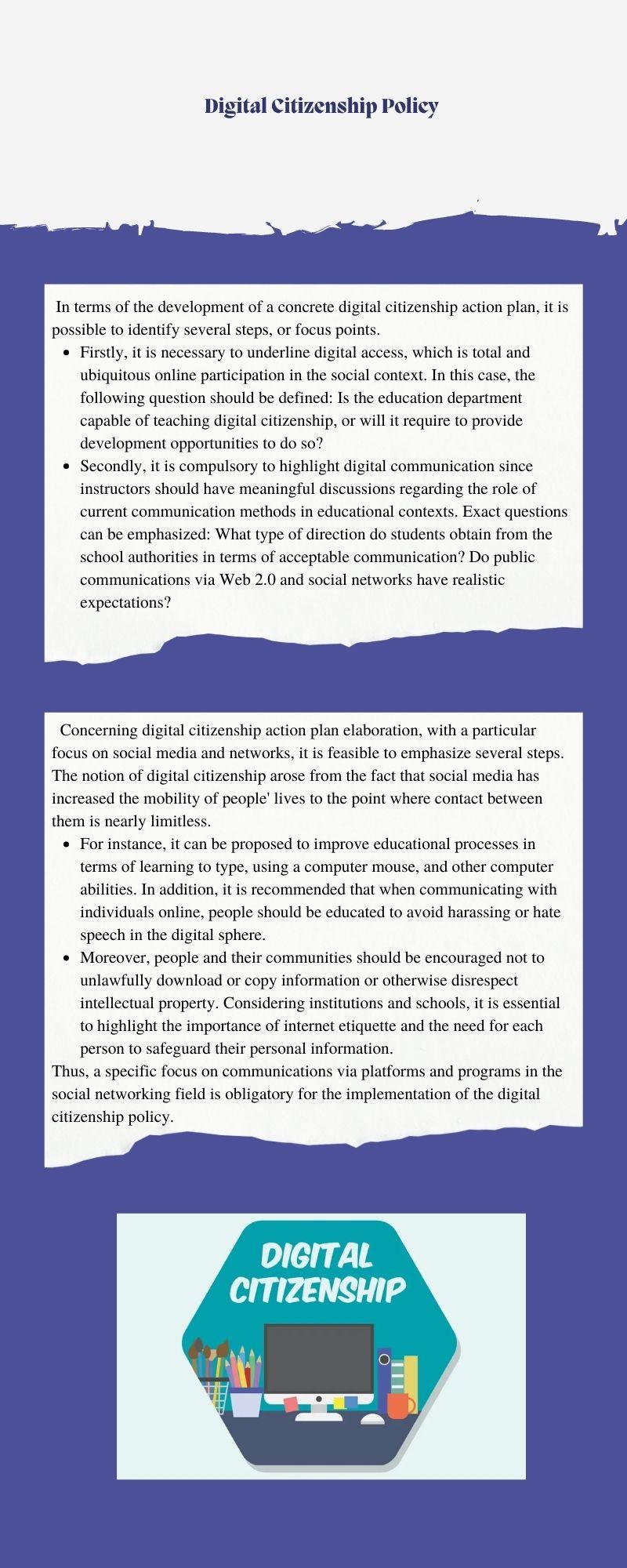In view of the growing usage of electronic and mobile information technology, educational institutions are re-examining permissible use guidelines. While acceptable usage policies were created to govern and control behavior, a digital citizenship plan requires a more holistic approach by acknowledging the critical value of education in developing digital citizens. The goal of the guideline plan is not to impose policy, but to provide guidance to executives as they work to better fulfill the needs of students and organizations. The objective of the action plan is to help school districts build a digital citizenship action strategies and policies to meet students’ demands. Furthermore, to provide policy creation guidance to aid in the protection of students operating in open, participatory, online contexts.
A digital citizen is a citizen who participates in society, economics, and government via the use of digital technologies. Teachers must be ready to play a key role in developing digital citizens that can participate ethically in the creation of a fairer world (Buchholz et al., 2020). In terms of the development of a concrete digital citizenship action plan, it is possible to identify several steps, or focus points. Firstly, it is necessary to underline digital access, which is total and ubiquitous online participation in the social context. In this case, the following question arises: Is the education department capable of teaching digital citizenship, or will it require to provide development opportunities to do so? Secondly, it is compulsory to highlight digital communication since instructors should have meaningful discussions regarding the role of current communication methods in educational contexts. Exact questions can be emphasized: What type of direction do students obtain from the school authorities in terms of acceptable communication? Do public communications via Web 2.0 and social networks have realistic expectations? In this situation, the aspects of electronic communication procedures should be clearly formulated.
Concerning digital citizenship action plan elaboration, with a particular focus on social media and networks, it is feasible to emphasize several steps. The notion of digital citizenship arose from the fact that social media has increased the mobility of people’ lives to the point where contact between them is nearly limitless. For instance, it can be proposed to improve educational processes in terms of learning to type, using a computer mouse, and other computer abilities. In addition, it is recommended that when communicating with individuals online, people should be educated to avoid harassing or hate speech in the digital sphere. Moreover, people and their communities should be encouraged not to unlawfully download or copy information or disrespect intellectual property in any other way. Considering institutions and schools, it is essential to highlight the importance of internet etiquette and the need for each person to safeguard their personal information. Thus, a specific focus on communications via platforms and programs in the social networking field is obligatory for the implementation of the digital citizenship policy.
To summarize, several phases, or emphasis areas, may be identified in the construction of a concrete digital citizenship action plan. To begin, it is important to emphasize digital access, which refers to entire and pervasive online engagement in social situations. Secondly, because instructors should engage relevant dialogues about the importance of modern communication technologies in educational contexts, it is imperative to highlight digital communication. The components of electronic communication processes should be explicitly stated in this circumstance. The concept of digital citizenship originated as a result of the increased mobility of people’s lives as a result of social media, to the point where communication between them is practically endless.

Reference
Buchholz, B. A., DeHart, J., & Moorman, G. (2020). Digital citizenship during a global pandemic: Moving beyond digital literacy. Journal of Adolescent & Adult Literacy, 64(1), 11-17.